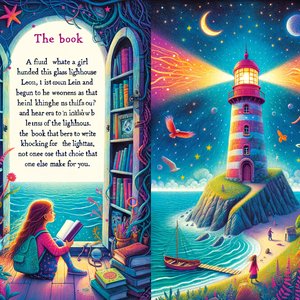Lantern made of glass

The morning in Silver Bay smelled of salt, wet sand and resin that the wind had pulled from the coastal pines. Seagulls circled over the harbour like paper aeroplanes, and the waves lay in even lines, as if someone had combed the sea with a comb. Zosia had arrived from town the previous evening, with a bag full of books and a pocket full of questions. She was going to spend the entire summer holidays at her grandfather Felix's place - a former lighthouse keeper and the best storm teller.
Her grandfather's house stood at the end of a narrow street, right next to the pier, which overlooked an old lighthouse with red and white stripes. No one lit it anymore. "Now it's more like a museum for seagulls" - laughed Grandpa, cleaning the torch that hung by the door like a medallion. In the evenings, he talked about the times when the light from the tower cut a safe corridor out of the mist. About the lights that appeared far out on the water, and those you didn't want to see too close.
Zosia listened, gazing at the maps and souvenirs on the walls: bottles with grains of sand from different beaches, shells where the wind sometimes really sounded, and an old brass compass, which never settled still. At night, when a storm rolled through, the house would swoop in the gusts and the windows would ring quietly, as if answering the distant bells of ships.
At dawn after that storm, they rang too. Susan opened the door, letting a fresh chill into the house, and saw that the shoreline had changed as if at the sea's behest. "It washed away yesterday's footprints," she muttered. Out of his pocket ran Leon, a year older cousin with a perpetual smile and dishevelled fringe. He had an amber net and a canteen with him, as he was always prepared "in case of the unusual".
"Let's go to the beach before everything dries out," he - he suggested. They left a note on the table for Grandpa ("We are on the shore. We have a compass and common sense. Zosia and Leon"), took their wellingtons and went between the dunes. The sand was cool and compacted, full of patterns drawn by the wind. Every now and then they came across treasures thrown up by the waves: a piece of net, a flat stone with a hole in it, a seagull feather twisted like a ribbon.
"Look!" - Leon crouched suddenly. Something under the thin layer of sand shimmered like an ice shell. He pushed the wet sand away with his hand and retrieved a palm-sized object, shiny and unusual: a metal feather. It was cool, very light and had high, delicate notches on the side, like lines on a bird's wing. When Zosia rubbed it with her sleeve, letters flashed in the sunlight, thinly scrawled: three dots, two dashes, one dot.
"It looks like it was made for something... made on purpose," - she said, and the pen in her hand trembled barely perceptibly, as if from breathing.
A few steps away, the sand cascaded down, revealing something even more unusual. A step. Transparent like the glass in which the sea was trapped. When Zosia touched it carefully with the tip of her wellington boots, she heard a quiet clink, warm and round, like from glass touched by a fingernail. They pushed the sand away. A second step appeared. A third. And a staircase, leading down towards a cliff that for years had seemed a mere dark wall.
"I don't think this is something you climb up..." - began Leon, but they were already standing on the first step, as if the stairs were beckoning them up by themselves. Zosia looked around: no one. Just seagulls, the wind and the rhythm of the waves. She pulled a small torch from her pocket, although the day was bright. The light flickered in the crevices of the stairs and went out as if someone had drunk it.
A door waited at the bottom. Wroxed in sandstone, milky, letting just enough light through to see the soft, pearly sheen behind them. Instead of the usual handle, it had a twisted shell, and above it - a tiny hole, shaped like a feather. Zosia and Leon looked at each other. The metal pen in Zosia's pocket suddenly became warm, as if it remembered this place better than they did.
"If this is a castle..." - whispered Leon.
Zosia slid the pen into the hole. It fitted perfectly. For a second nothing happened, only the smell of wet planks and sea salt wafted through the air. Then something in the lock vibrated, a secretive mechanism opened with a quiet sigh, and the door gave way. They did not creak. Beyond the threshold, it smelled of cold and... light.
They entered an interior that seemed made of morning itself. The walls were neither stone nor glass, but moved lightly, like a sheet of water on a day without wind. Thin dust floated down the spiral steps of iridescent glass, glowing as they scoured it away. On the balustrade, someone had carved tiny fish, stars and lines resembling maps - except that instead of the names of the ports, they had words on them: Tide, Breath, Silence, Glow.
"Lighthouse..." - Leon raised his head. Higher up, beyond more steps, shone a lens as big as a window. In the middle of the room, a book in blue cloth lay on a low pedestal. Around it, the air tinkled like an eyelid.
Zosia, holding her pen, cautiously approached the book. She touched the cover. The linen was dry, but as cool as a shadow. There was no print on the first page. Just linen fibres and a slight sheen, as if the page had just been ironed by someone. Zosia held the page with her finger. Something trembled. A drop of water, which had dripped down her wet sleeve, fell onto the paper and disintegrated into letters.
The letters arranged themselves. Unsteadily at first, like the legs of a chick, and then more and more confidently, line by line. "Hello, Zosia." Zosia gasped. "Hello, Leon." - added the next words. "If you are here, it means the sea has opened the stairs. This happens rarely and usually for a reason that cannot be described in one breath."
Zosia swallowed her saliva. Leon rested his hands on his knees, as he always did when things got serious. The pages turned of their own accord, although the draught was not there.
"A lantern made of glass does not shine for ships. It shines for him who does not get lost, only sometimes forgets where he has the way. Its light opens but also closes. Be careful before you turn the key," was written on the paper in an even, calm handwriting.
A quiet sound came from the ceiling. It could not normally be heard; rather, it could be felt on the skin, like ants running over your shoulder. Zosia and Leon looked up. The lens, like a big eye, had gone blue, and there were tiny bubbles that ran upwards and then disappeared, as if someone was eating them from the inside.
"Do you hear?" - Leon lowered his voice. Somewhere far away, as if from under the water, a soft, orderly tapping sounded. Three quick ones, two longer ones, three quick ones again. Susan felt her heart speed up, and she didn't know whether it was from curiosity or something that resembled a shadow of fear.
"It's not Morse code, is it?" - reassured Leon, who knew the alphabet of sounds from his grandfather's stories. He shook his head. "A different rhythm."
The book beeped with the paper, as if something was teasing it. "Do not light the lantern if the sea breathes double" - appeared on a new page. Zosia pressed her hand against the cool railing. From the side of the entrance, where the glass staircase had been left, the soft, distorted sound of waves reached them. Once harder, once quieter, as if the sea were really taking a double breath.
"Whatever it means, I think that's what it's doing". - she whispered.
At the same instant, the lens blinked and fluttered with a light so soft that it was uncertain whether it was the light or just a change in the air. The tapping came back. Now it coalesced into something that Zosia recognised more with her heart than her ear: Zo-si-a. A name breaking up into sounds and folding again.
"Someone there?" - Leon reflexively took a step back, but did not run away. His fingers tightened on the strap of the canteen.
"Not someone... something?" - Zosia replied and pushed her hair back from her forehead. The light from the powdered glass danced across her cheeks. The book turned a page and put up a blob, as if she was hesitating about what to write. "If you hear your name, remember: first check who's calling it." - flowed out on the paper at last. The ink was lighter, as if diluted with water.
The floor underfoot shook slightly again. From far away, from the very belly of the cliff, came a deafening bell. Once. A second. A third. Zosia looked up at Leon. The sky behind the milky walls had darkened, as if the sun had entered the cloud. In the passage on the left, which they had not noticed before, shone a door different from the one outside: narrow, with a pearl handle and a plain black lock without a hole. They smelled of distant rain and something that might have been a chill from the bottom.
"That sound over there... I think it's from over there," - Leon whispered, and goosebumps stood up on his arms.
Zosia looked back. Through the milky glass, all she could see was the sea-laid glow. The stairs outside - she could feel it in her bones - were beginning to disappear under the tide. The book twitched and shimmered. "Do not open when the walrus..." - the lines stopped, as if out of breath. A stain of incaustic spilled into a shape that could have been a wave or a hand putting a finger to its lips.
The tapping outside the door shifted into a rhythm that could not be ignored. It now sounded like two quick knocks, a pause, three heavier thumps. A shadowy blue ran along the handle of the pearl door. The metal pen in Zosia's hand warmed almost to the warmth of her palm. The air thickened, as if the lantern had held its breath with them.
Leon took a breath and let it out very slowly. "If someone built this lighthouse, it was for something," he - he said in a half-hearted voice, although no one but them could hear it. Zosia nodded uncertainly. Her heart was pounding in her ears so loudly that it almost drowned out the sea.
Then the pearl handle moved. At first a little, tentatively. Then more distinctly, as if someone on the other side had laid a hand on it. The lock hummed quietly, like a pipe filling with water. The book jerked a page and stopped gaping mid-sentence. Around the lens, shadows swam in the thickness of the glass, like dormant fish suddenly awakened by light.
Sophie tightened her fingers on the pen-key and took a half-step forward, feeling a chill on her face that was no wind. On the other side of the door, clearly, definitely, someone was just turning the lock from the inside.
Autor zakończenia:

 English
English
 polski
polski
 Co było dalej?
Co było dalej?



